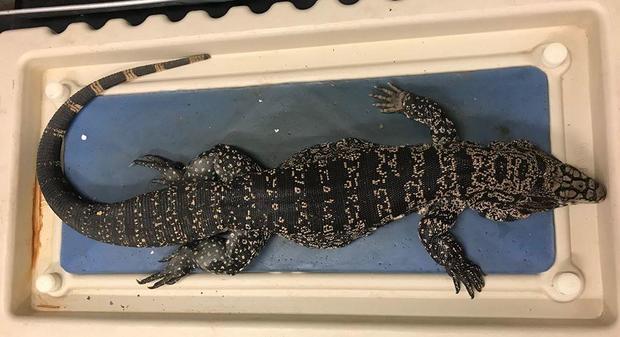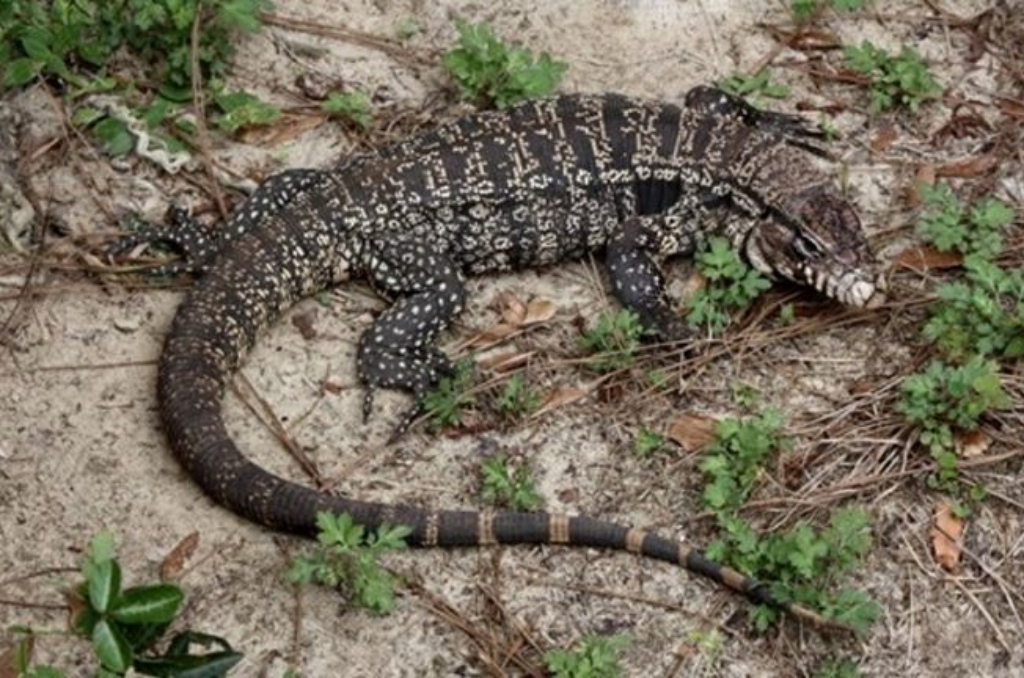Argentine black and white tegu. Photo and Caption: Stan Kirkland/Florida FWC/www.fox13news.com
The culprit is what is known as the Argentine Black and White Tegu and it is posing a real threat to wildlife in Florida and Georgia.
The Argentine Black and White Tegu is the largest lizard of its species. It can grow up to 4-feet long and weigh 10 pounds. The Department of Natural Resources (DNR) said many people report them to officials mistaking them for baby alligators.
It has been established as an exotic, invasive type of species in several sites in South Florida. The Florida Fish and Wildlife Conservation (FWC) Commission says there are established breeding populations in both Hillsborough and Miami-Dade counties. Researchers believe these populations occurred through escapes or intentional pet releases.
“Tegus are not native to our state and have been known to eat native species including the eggs of alligators and threatened wildlife, such as hatchling gopher tortoises,” according to the Georgia Wildlife Resources Division website. “Adult tegus have few predators and can multiply quickly. Females reach reproductive age at about 12 inches long or after their second season of brumation. They can lay about 35 eggs a year.”
Young Argentine black and white tegu. Photo and Caption: Dustin Smith/www.fox13news.com
“Potential impacts of tegus include competition with and preying upon Florida’s native wildlife, including some imperiled and protected species,” the FWC’s website says. “Tegus prey upon the nests of other animals, and researchers have documented tegus eating American alligator eggs and disturbing American crocodile nests in Florida.”
According to the DNR, the lizard has established itself in Toombs and Tattnall counties in southeast Georgia as well. DNR officials say Tegus will eat the eggs of ground-nesting birds such as quail and turkeys and other reptiles, such as American alligators and gopher tortoises, which are protected species. They will also eat chicken eggs, fruit, vegetables, plants, pet food, carrion and small live animals, from grasshoppers to young gopher tortoises.
The DNR and its partners are working to eradicate a wild population in Toombs and Tattnall counties. They’re worried the lizards have the potential to spread “rapidly” to other parts of Georgia. While the lizards are legal as pets in Georgia, it is illegal to release them into the wild.

The Orianne Society, which is dedicated to the conservation of reptiles and amphibians, also put out a warning about the invasive lizards. “Established from escaped or released pets, these large lizards are voracious predators that have been found consuming a variety of native wildlife in the longer-established Florida populations,” the Orianne Society wrote on their Facebook page.
The Society said it believes tegus are able to survive the state’s cold winters, meaning their population has the potential to spread rapidly. “It is critical to remove invasive species early in the invasion process to have the best chance of success,” the society said. “All sightings should be immediately reported to Georgia DNR.”
Tegus are not the only invasive species to make headlines. The Asian giant hornet, Vespa mandarinia, has made its way to the United States. These invasive creatures have been known to kill up to 50 people a year in Japan, according to The New York Times. The insects also have the potential to devastate the U.S. bee populations, which have already been declining.
In Florida, you can help by taking a picture, noting the location, and reporting this information by calling FWC at 1-888-Ive-Got1 (888-483-4681), or by reporting online at IveGot1.org. The Georgia DNR asks that you note the location, take a photo if possible and report the sighting online at www.gainvasives.org/tegus.
Melissa’s career in writing started more than 20 years ago. Today, she lives in South Florida with her husband and two boys.

